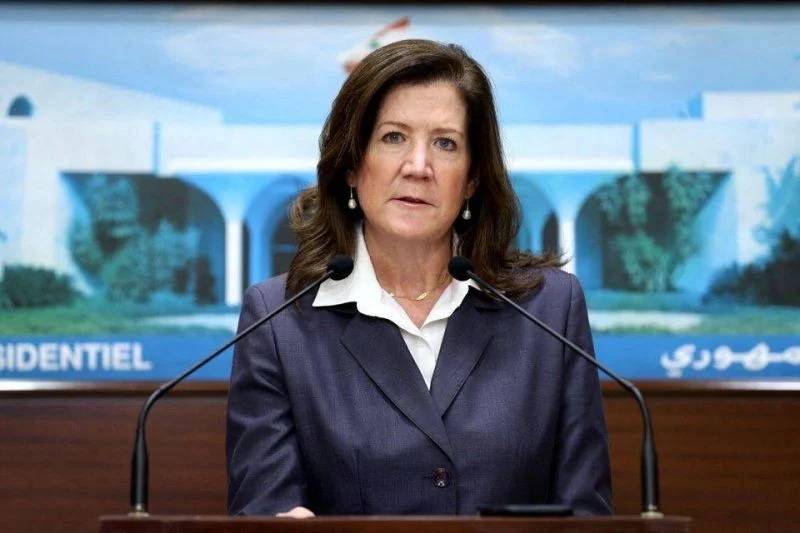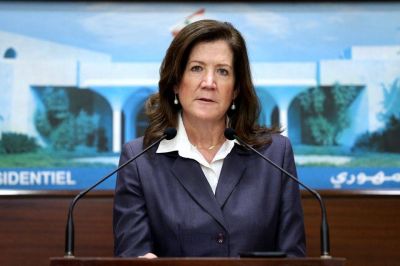
US Ambassador to Lebanon Dorothy Shea. (Credit: Photo archives Dalati and Nohra)
Lebanon’s recent signing of a historic maritime border deal with Israel shows that “when there’s political will,” Lebanon is capable of making historic achievements, US Ambassador Dorothy Shea said, describing the Oct. 27 deal as a “major accomplishment.” This agreement, which “represents the most compelling, if still a kind of a glimmer of hope on the economic horizon for the Lebanese people,” paves the way for other deliverables, she continued.
She added that Lebanon must therefore not stop here, and must instead implement a basket of reforms and take a series of hard decisions on the economic and political levels. Only then will it be able to show the international community its willingness to overcome its current economic crisis, the ambassador emphasized Friday during a meeting and Q&A with the press, attended by L’Orient-Le Jour, held at the US Embassy north of Beirut.
The desperate need for the IMF
“I would just right off the bat offer congratulations to Lebanon,” said the US ambassador, who recognized that the maritime border demarcation deal between Lebanon and Israel is an “historic achievement” of which “the Lebanese should be proud.”
“I knew in my heart of hearts that this deal was within reach when the three presidents [Lebanon’s president, prime minister and parliament speaker] came together to receive Amos Hochstein [in] August,” she revealed.
“Hard decisions can be made and acted on, when there's political will,” Shea continued, calling on Lebanon’s leadership to “take that same spirit and apply it to all of the other hard decisions that are pending.” Because a political class in crisis could risk pausing “on some of the other sticky, onerous reforms that are needed,” she said, Lebanon needs “that same energy and willpower to drive through what I believe should be a basket of accomplishments.”
After the maritime border demarcation agreement, Lebanon “desperately need[s] that IMF staff-level agreement to come to fruition in terms of financing,” Shea said, referring to an agreement that would provide $3 billion to Lebanon over a period of four years. But to ensure the agreement bears fruit, Shea highlighted that Lebanon “need[s] to do the eight prior conditions that the IMF laid out.”
In other words, it needs to implement reforms, including banking sector restructuring, a central bank audit, lifting banking secrecy, and medium-term debt restructuring.
Commenting on the remarks that the money on the table from the IMF is a very modest sum, Shea said, “I don't see anybody else lining up, knocking on Lebanon’s doors, saying, let us give you $3 billion. And beyond that, $3 billion are the reforms that are going to make the economy here much more attractive to invest into, but also the stamp of approval that comes with the IMF.”
“… unfortunately Lebanon is in the position of needing that last resort to lubricate its economy,” the diplomat said.
In response to critics of the international financial institution, Shea said, “there is no other alternative to the IMF,” particularly since the country does not “have the benefit of the liquidity.”
“I think the pressure is already here coming from the Lebanese people who are at the end of their ropes, you know, when they can’t even get a driver’s license or a report of birth …,” she said, recalling “the collapse of infrastructure such as water, which allows the cholera bacteria to spread.”
Returning to the basket of things she would like to see Lebanon achieve, Shea said, “the regional energy deal” must be included. Lebanon's gas imports from Egypt and electric power from Jordan that “we've been working on for over a year now” are delayed, she said, arguing that “some of the reasons [for this] are unacceptable.”
“There's no reason why the Ministry of Energy couldn’t have already taken steps to begin recruiting for the Electricity Regulatory Agency, for example. That was one of the conditions the World Bank proposed for even bringing this $150 million loan to a vote at the World Bank board of directors,” Shea pointed out.
She continued to explain that in her view, while the increase in electricity tariffs went into effect on Nov. 1, “they could have done that months ago ….”
Shea also pointed out that “they [the Lebanese state] also still do need to work on the cost recovery plan because far too many have been helping themselves to electricity and not paying for it. And that’s not sustainable, obviously.”
According to the diplomat, “the World Bank, before it’s going to bankroll an energy intervention, needs to have some indication that there's a cabinet-approved plan to rectify those losses.”
“Once those are met, we can get a vote in Washington. The United States is definitely prepared to support that,” she said.
Presidency: the past must not be repeated
Commenting on the presidential election and the formation of a full-fledged cabinet, the US diplomat referred to the speech of US assistant secretary, Ambassador Barbara Leaf, on Friday evening, in which she made “strong statements about the dereliction of duty that no one should tolerate if the Parliament does not do its job and elect a president.”
“The Lebanese people cannot afford a repeat of what happened the last time when it [the presidential election] took two and a half years,” Shea said.
While she refused to express support for any particular candidate, she nevertheless listed the characteristics of an ideal president: someone who puts “the interests of the country first ahead of personal interests, ahead of party interests, ahead of sectarian interests” and who is “well qualified with problem solving skills to address all of these challenges that are facing the country and to build those coalitions that are going to need to be built, within your own governing structures, but also with the international community, and someone who has the skills to deal with the IMF and the World Bank in particular. And somebody who is not tainted by corruption.”
Once this president is elected, Lebanon is “going to need a fully empowered government. And ideally, have those two arms of the government work closely and in partnership, together with the Parliament, to continue with the momentum that has been generated to do and make real these reforms.”
“Once you get all of that, then Lebanon can credibly make the [its] case to the whole world and most importantly, to the private sector,” she added.
This article was originally published in French in L'Orient-Le Jour. Translation by Joelle El Khoury.
